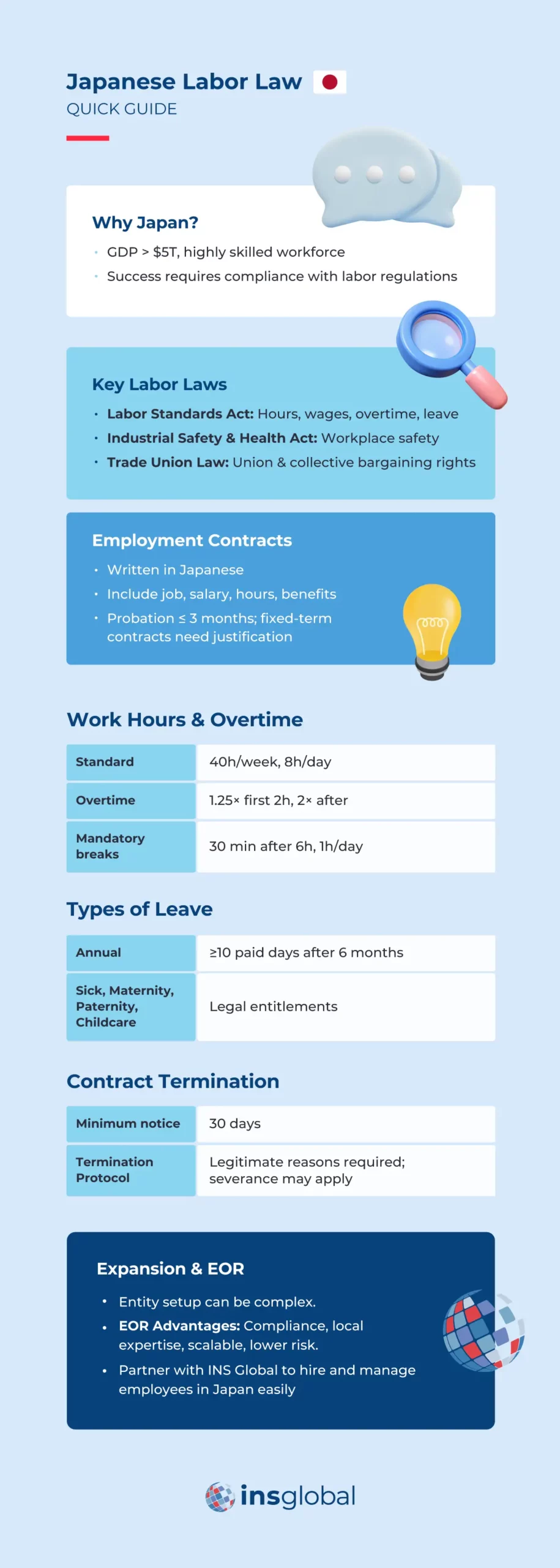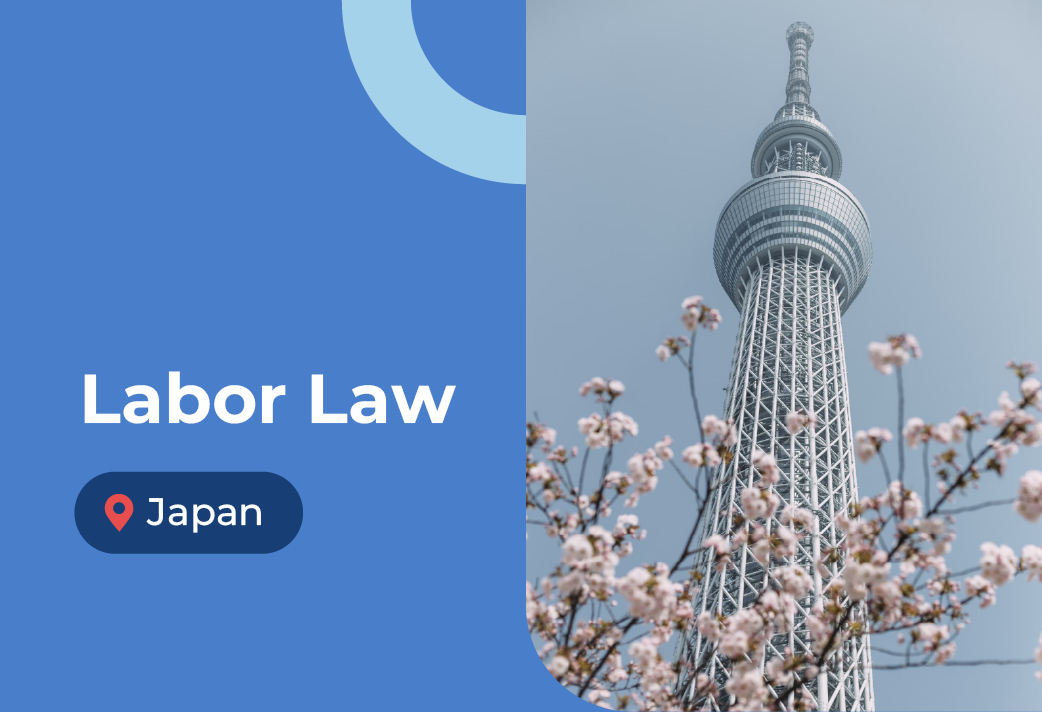Japan’s robust economy and highly skilled workforce make it an attractive destination for international expansion. With a GDP exceeding $5 trillion in 2023, the world’s third largest, the potential is undeniable. However, navigating the intricacies of Japanese labor law is crucial for success.
This guide provides a clear and concise overview of key regulations, processes, and best practices to ensure you operate in compliance with the latest labor regulations in Japan.

Tired of scrolling? Download a PDF version for easier offline reading and sharing with coworkers
Understanding the Fundamentals of Japanese Labor Law
While Japanese labor law might seem complex, its core principles prioritize a collaborative employer-employee relationship. Here are some essential laws to remember:
- Labor Standards Act (LSA) – The cornerstone of Japanese labor law, regulating aspects like working hours, minimum wages, overtime pay, and leave entitlements.
- Industrial Safety and Health Act – Ensures employee safety and well-being in the workplace, outlining specific safety measures and reporting requirements.
- Trade Union Law – Defines rights and procedures for employee unionization and collective bargaining.
Staying updated on the latest amendments and interpretations of Japanese labor law is crucial. It is strongly advised to seek advice from legal experts or use dependable sources for information, especially when this information may change over time.
Employment Contracts in Japan
Written employment contracts are mandatory in Japan. Clearly outline terms like job description, compensation, working hours, and benefits, ensuring compliance with Japanese labor law.
Contracts must be written in Japanese to be legally valid. Probation periods cannot exceed three months. Fixed-term contracts have limitations and require specific justifications.
Independent contractors require separate agreements adhering to specific tax and social security regulations. Having clear and legally compliant contracts protects both employers and employees under Japanese labor law.
Working Hours and Overtime in Japan
The standard workweek in Japan is 40 hours, with a maximum daily workday of 8 hours. However, overwork is an acknowledged problem in the country, with many employees expected to go way above and beyond standard work hours. Hence, adhering to Japanese labor laws concerning work hours and extra time promotes a healthy workplace atmosphere and averts legal complications.
Overtime is permitted in Japan, and unofficial overtime is extremely common. Officially, it must be compensated at 1.25 times the regular wage rate for the first two hours and double the rate thereafter, as stipulated by Japanese labor law.
Rest periods of 30 minutes after 6 hours of continuous work and one hour of break time per day are mandatory.
Night work regulations apply, requiring additional compensation and shorter working hours, as outlined in Japanese labor law.

Types of Leave: Understanding Entitlements under Japanese Labor Law
Japanese labor law mandates various types of leave for employees, including:
- Annual leave – Employees are entitled to at least 10 paid days of annual leave after six months of continuous service, increasing with additional years of service.
- Sick leave – Paid sick leave is granted based on doctor’s recommendations and length of service, as per Japanese labor law.
- Maternity leave – Up to one year of paid maternity leave is legally mandated, along with additional unpaid leave options.
- Paternity leave – Up to 52 weeks of unpaid leave is available for fathers, although only a few days are typically compensated by employers.
- Childcare leave – Both parents are entitled to childcare leave until their child reaches 2 years old, with limited paid options under certain circumstances.
Employers are required to comply with these leave regulations and facilitate seamless transitions for employees going on approved leave, as mandated by Japanese employment law.
Termination and Notice Periods in Japan
The notice periods for termination can differ based on the employee’s tenure and type of employment. However, a minimum notice period of 30 days is mandatory as per Japanese labor law.
Ending Employment in Japan
Ending an employee’s contract in Japan necessitates adherence to particular protocols stipulated in Japanese employment law, such as giving legitimate reasons and suitable notice periods. Moreover, under specific conditions, a severance package may be obligatory.
The amount of severance pay depends on several factors, as outlined in Japanese labor law:
- Reason for termination – Retrenchment (closure of a business unit or downsizing) often requires severance pay calculated based on length of service.
- Employee’s position – Managerial or senior-level employees may be entitled to higher severance packages as per contracts or company policies.
- Existence of a severance clause – Contracts may stipulate specific severance terms, potentially exceeding legal minimums.
Consulting with legal professionals familiar with Japanese labor law is highly recommended before terminating any employee, especially in complex situations.
Establishing an Entity in Japan
Expanding to Japan requires establishing a local business entity, which can involve numerous legal and administrative hurdles. While navigating alone is possible, partnering with an Employer of Record (EOR) streamlines the process and safeguards your compliance with Japanese labor law.
This process of opening a new entity in Japan can be time-consuming and complex, demanding expertise in Japanese labor law and regulations. Partnering with an EOR alleviates these burdens by handling the entire registration process on your behalf, ensuring smooth and compliant entry into the Japanese market.
Why Choose an EOR for Your Japanese Expansion?
With extensive experience navigating Japanese labor law and regulations, an EOR offers several advantages:
- Reduced Risks and Costs – EORs handle legal complexities and compliance, minimizing potential risks and associated costs stemming from non-compliance with Japanese labor law.
- Streamlined Operations – An EOR partner removes the need for everything from entity setup to ongoing compliance with Japanese labor law. This outsourcing allows you to focus on more core business activities.
- Local Expertise – Their team possesses in-depth knowledge of local regulations and cultural practices, ensuring smooth operations and effective employee relations that are aligned with Japanese labor law best practices.
- Scalability – EOR solutions are able to constantly adapt to your evolving needs as your business grows in Japan
By partnering with a reputable Employer of Record in Japan, you gain valuable expertise, peace of mind, and the freedom to focus on growing your business successfully in the dynamic Japanese market, all while maintaining compliance with Japanese labor law throughout your journey.
Get in touch with INS Global today to talk about your plans for expanding into Japan and learn how our EOR solutions can bolster your success, guaranteeing smooth adherence to Japanese employment law throughout your venture.


SHARE